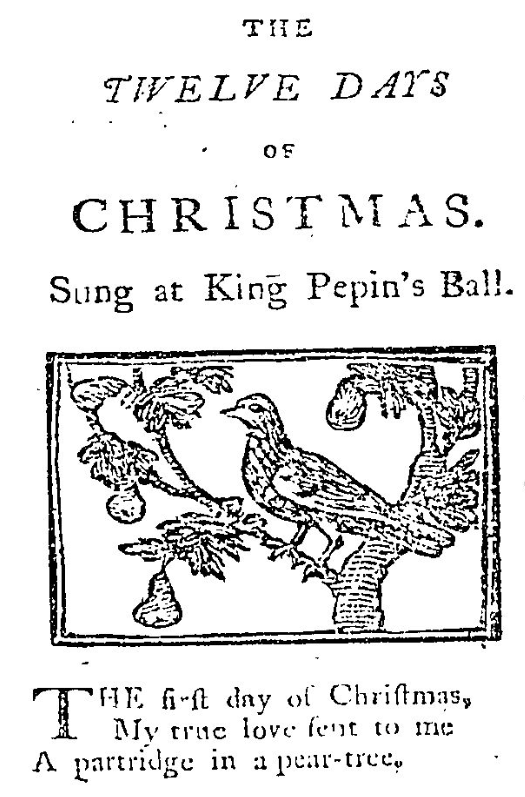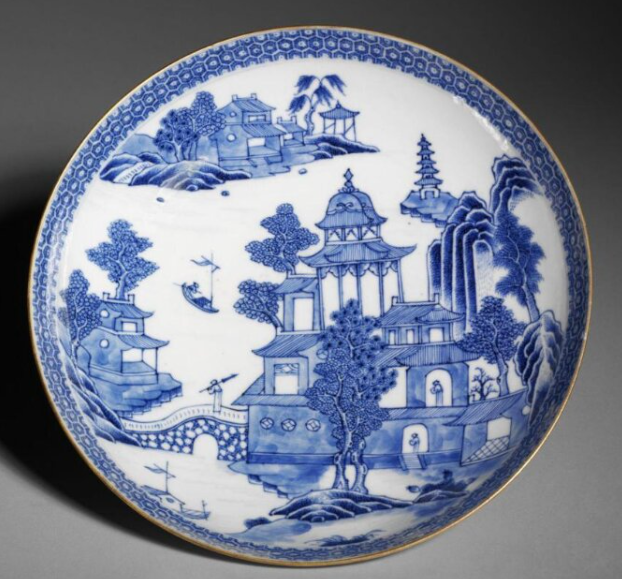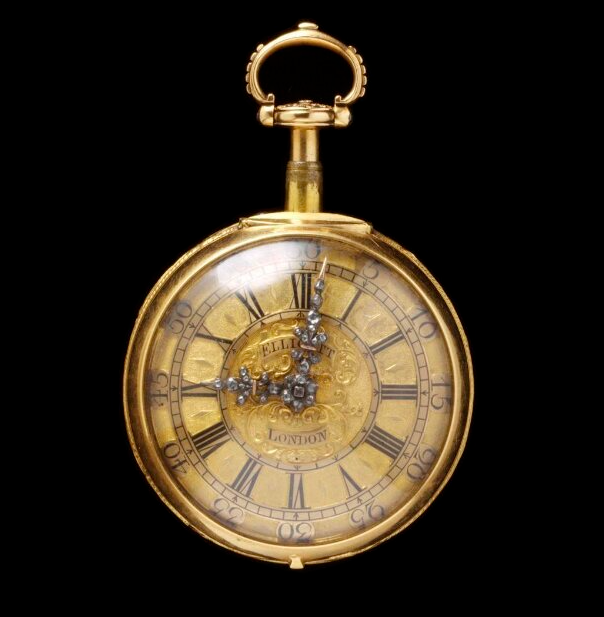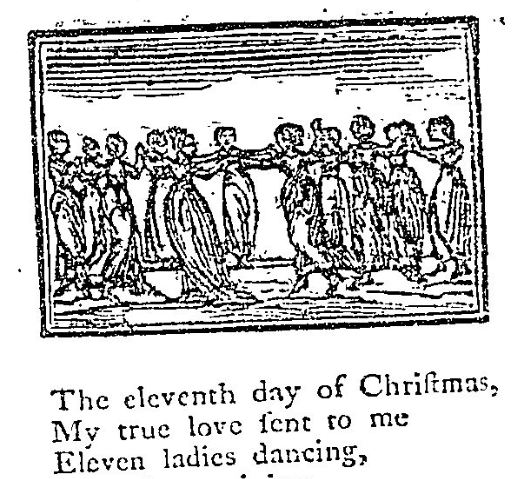Posted by e.m.vine@exeter.ac.uk
16 December 2024
Our project is analysing a sample of 25,000 wills, and when writing each ‘Will of the Month’ post, it can be difficult to know how to select just one to write about. For December’s post, we wanted to write about a will with a loosely ‘Christmassy’ theme. Because the names of all the testators whose wills were proved in the Prerogative Court of Canterbury are searchable, we were able to search for the wills of people with Christmas-related names. Accordingly we could have written about the will of Christmas Evans, a milkman of Bermondsey, Richard Christmas, a cloth worker, or about the lives of Gingerbread Johnson, Thomas Merry, Elizabeth Holly, Joan Stocking or Theophila Sledges, or, our personal favourite, a distiller named ‘Frostan Snow’. Yet we’ve settled on a testator who had both a Christmas-adjacent name and who made a range of interesting bequests, and this is one Mary Partridge.1
Left: Anonymous (1780). First page of the carol ‘The Twelve Days of Christmas’ from Mirth without Mischief.
A pear tree?
Mary Partridge was a spinster from Somerset who died in November 1786, six years after the first known publication of the words to the carol ‘The Twelve Days of Christmas’.2 Unfortunately, Partridge did not make a bequest of an individual pear tree, but she did leave shares in orchards, gardens, and land she held in her native town of Chard. As well as using her will to transfer her shares in land, Partridge distributed money, household furnishings, and personal possessions to friends and family. Unmarried and without children, Partridge’s closest living relative appears to have been her nephew John Pope, who she left ‘my household Goods and ffurniture’. At first this seems a fairly comprehensive bequest of everything in her house, and indeed many wills lumped together ‘all household goods and furniture’ in one bequest, without itemising individual ‘moveable’ property such as beds or chairs.
But like many testators, Partridge drew a distinction between household goods and some specific items of tableware or personal possessions, which were set aside for other beneficiaries. It is notable that many of these itemised bequests were left to other women. Partridge gave to one Susanna Harcombe ‘my China together with my Silver Table and Tea Spoons’. She appeared to have set aside the more valuable or decorative items of silverware or tableware as distinct from the residue of her household goods.

A ‘Mrs Hannah Cannicott’ received ‘one hundred pounds and my wearing apparel’. As with the bequest of ‘my household Goods’, this was a blanket bequest of all clothing, rather than an itemised list of gowns, hats, petticoats, or gloves as sometimes appear in other wills. One of the main purposes of wills was to provide sufficient description to ensure that the correct bequest was identified and given to the correct beneficiary – a newly-purchased pair of leather gloves to a favourite sister, a red petticoat to an eldest daughter, a best hat to a most valued friend. (For more examples of ‘best’ hats, see our blog post about a Gloucester capmaker). But in cases where all ‘wearing apparel’ was left to the same beneficiary, there was of course no need to itemise or describe each item.
Five gold rings?
Having established that Mary Partridge did not bequeath a pear tree, it would have been fitting perhaps if she had instead owned swans, geese, or perhaps five gold rings. Unfortunately, Partridge only left one ring, but another of our recent blog posts discusses a will which mentioned three. This singular ring was left to Susanna Harcombe, abovementioned recipient of china and silver spoons, and was described only as ‘my ring’. From the lack of description, and as there were no other rings mentioned as among Partridge’s possessions, we can assume that this was Partridge’s only ring. Equally, neither its materiality (my gold ring), nor function (my seal ring) were mentioned. It is ‘my ring’ not ‘a ring’, and its location is not specified (e.g. ‘the ring in my jewellery box’). As such we might infer that this ring was worn by Mary Partridge, that it could be found about her person, and that she was never usually parted from it.
A lack of description might suggest that an item could be easily identified amongst an individual’s possessions. Yet occasionally seemingly unique or clearly identifiable items were described in greater detail. Partridge gave to Mary Edwards ‘my Gold Watch which was her Aunts Mrs Warrys’. As well as being a valuable and fashionable item, the description hints at the personal connection between Partridge, Edwards, and Mrs Warry. Without further information we can’t be sure of the relationship between these women. Yet Partridge’s will is an example of how small, valuable personal possessions, such as rings and watches, moved between female friends and relatives. The value of the gold watch was enhanced by it having once been a prized possession of Mary Partridge, and before that of Mrs Warry.

While only one ring was owned by Mary Partridge, another was mentioned in the will. Partridge left a bequest ‘unto Mr Robert James One Guinea to buy him a Ring’. This money would be left to James to purchase a mourning ring designed to be worn in remembrance, but mourning rings also held monetary value and were a means of transferring wealth. ‘Mourning’ was also mentioned in the will’s most poignant bequest. Partridge gave ‘Mourning unto Mary Harcombe and Betty Silvester Daughter of George Silvester as a reward for the care they have taken of me during my Illness’. Although no further detail is given other than ‘mourning’ this was likely again money set aside so that Mary and Betty could buy suitable mourning clothing, or perhaps a ring. This bequest was a recognition of Mary and Betty’s labour in caring for Partridge during what was likely the illness that prompted her to make her will.
Ladies and Maids?

Mary Partridge’s will was fairly standard in many ways, and it acts as an insight into the life of a woman about whom we know only a tantalising amount. She was a spinster, but a relatively wealthy woman – with hundreds of pounds and shares in land, a gold watch and some decorative china to disperse. The only relative that Partridge identifies is her nephew, John Pope. Pope’s mother, presumably Partridge’s sister, does not appear to be mentioned, yet it is possible that, if living, she had remarried and had a different name. Several surnames were repeated in the will, and several women were named as beneficiaries, but we do not know from the will alone if any of these were relatives by blood or marriage.
The care between these women is most tangibly expressed in the nursing of Mary Partridge during her sickness and the bequests of personal possessions within this female network. For a loosely Christmas-themed blog post that set out to find connections with the ‘Twelve days of Christmas’, we’ve largely failed to find evidence of pear trees and geese. But, along with some gold rings, it is gifting, and considered bequests as expressions of love, that wills provide plentiful evidence for.
PROB 11/1147/220, Will of Mary Partridge, Spinster of Chard, Somerset, 13 November 1786
Mary Partridge
This is the Last Will and Testament
of me, Mary Partridge of Chard in the County of Somerset
Spinster ffirst I Give and Bequeath unto Mrs Hannah
Cannicott one hundred pounds and my wearing apparel
also I Give to Mrs Rebecca Bennett twenty pounds
and to Sarah the Wife of William Clapp ten pounds
To Ann the wife of Edward Read ten pounds and
Mourning and to Charles and Mary Son and Daughter
of Mr Charles Edwards the sum of fifty pounds each
which said several Legacies my Will is shall be paid
by my Executors hereinafter named in six Months next
after my Decease also I Give my Household Goods and
ffurniture unto my Nephew John Pope Likewise I
Give unto the said Mary Edwards my Gold Watch
which was her Aunts Mrs Warrys also I Give unto
Susanna the wife of Joshua Harcombe my China
together with my Silver Table and Tea Spoons and
[new page]
also I give unto Mr Robert James One Guinea to buy him a Ring
my Ring ^ likewise I give Mourning unto Mary Harcombe and
Betty Silvester Daughter of George Silvester as a reward for
the care they have taken of me during my Illness
ffurther I Give and devise unto them the said Joshua
Harcombe Charles Edwards the ffather and Robert James
all my several purparties shares and proportions of and
in the messuage or Tenement Gardens Orchard and
several Closes of Land in Chard aforesaid formerly
George Selwoods lately occupied by George Warry and
now by them the said Joshua Harcombe and Charles
Edwards to hold the same unto and to the use of them
the said Joshua Harcombe Charles Edwards and Robert
James their Heirs and Assigns upon Trust to sell the
same for the sum of two hundred and seventy five
pounds and pay and apply the Money arising thereby in
manner hereinafter mentioned but my Will is that the
Receipt and receipts of my said Trustees and the survivor
of them his heirs and assigns to the purchase of the
said premises shall be a good and effectual discharge to
such purchaser who on taking such Receipt shall be
obliged to look to or see the application thereof or be
answerable for the misapplication or non application thereof
also all the Rest and Residue of my Goods and Chattels Money
and securities for Money and all other my Personal
and Testamentary Estate whatsoever and wheresoever and of
what nature or kind soever I Give and Bequeath unto
them the said Joshua Harcombe Charles Edwards and Robert
James upon the Trusts and for the purposes herein after
mentioned (that is to say) ffirst to pay my ffuneral Expences
the expences attending the execution of this my Will and
all my Just Debts and Legacies and as to all the residue
and Surplus Money of my said personal Estate and the
said sum of two hundred and seventy five pounds to
arise by the sale as aforesaid on Trust to put and place
the same out at Interest upon such security or securities
as to them shall seem meet and do and shall pay the
sum of One hundred pounds unto each of the Children
of my said Nephew John Pope as they shall respectively
attain their several ages of twenty one years as well
those who are now born as to those who may ^ be hereafter
born and do and shall after the death of the said John
Pope pay and Divide the Surplus money after payment
of the said sum of One hundred pounds to each of his
Children as aforesaid equally between all his Children then
living but my Will is that my said Nephew John Pope
shall have and take the Interest of my said Residuary
Effects until the Legacies to his Children shall become
payable and the remainder distributable amongst them
in manner aforesaid on this express Condition nevertheless
that he and his wife shall Join in doing all such onto
as may be necessary for the conveying a good Title to a
purchaser in the premises aforesaid or otherwise the Interest
[new page]
to accumulate after his death to be divided as the principal
money equally among his Children then living and I do
hereby authorise and empower my said Trustees to deduct
and retain out of my said Estate and Effects all Costs
and Charges and for Labour ffees Journies and attendances
attending the execution of the Trusts hereby in them
reposed and to compound any debt or debts that now is
or are or may at any time hereafter be due to my
Estate and Lastly I do constitute and appoint the said
Joshua Harcombe Charles Edwards and Robert James Ex[ecut]ors
of this my Will In Trust for the purposes aforesaid In
Witness whereof I have to this my last Will and Testament
contained in three sheets of paper, to the two first sheets
thereof subscribed my name and to this third and last
sheet thereof subscribed my name and set my seal this
eighth day of August in the year of our Lord one
thousand seven hundred and eighty six Mary Partridge (L.S.)
Signed sealed published and declared by the said Mary
Partridge the Testatrix as and for her last will and
Testament in the presence of us three who at her request
and in her presence and in the presence of each other
have subscribed our names as Witnesses thereto Rot Jese
Saml Silvester Robert Silvester